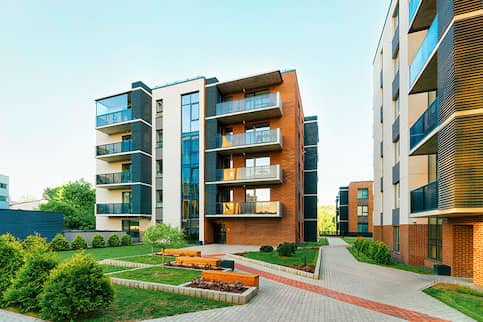The Ultimate Comparison: HOA Condo vs. Typical Home
The Ultimate Comparison: HOA Condo vs. Typical Home
Blog Article
The Function of an HOA in Establishing and Enforcing Area Guidelines for Citizens
The duty of a Homeowners Organization (HOA) in imposing and establishing community guidelines is basic to keeping a organized and natural property atmosphere. By formulating clear guidelines that govern facets such as building maintenance and community conduct, the HOA not just establishes standards for residents yet likewise fosters a feeling of belonging and responsibility.
Comprehending Homeowners Organizations
Homeowners organizations (HOAs) work as governing bodies for property communities, playing an essential duty in preserving residential or commercial property values and cultivating a sense of area. Normally formed by programmers, HOAs are composed of home owners within a designated location who choose a board to supervise the organization's activities. The primary features of an HOA include implementing community regulations, managing usual areas, and organizing area events.
HOAs operate under a set of controling records, consisting of problems, restrictions, and agreements (CC&R s), which detail the rights and obligations of home owners. These regulations aim to make sure that residential properties are kept to a certain standard, consequently shielding the aesthetic charm and total worth of the area. Additionally, HOAs frequently gather fees from home owners to fund upkeep, landscape design, and various other social work.
The visibility of an HOA can dramatically affect the living experience within a neighborhood (hoa condo). While some locals value the organized setting and amenities provided, others might locate particular policies restrictive. Balancing the interests of all property owners is vital for an HOA to work efficiently, guaranteeing that it serves its designated objective of boosting area living while appreciating private house owner legal rights
Establishing Neighborhood Standards

To begin, an HOA should conduct studies or hold meetings that enable homeowners to articulate their suggestions and concerns. This participatory process cultivates a sense of ownership and enhances compliance. Next, the HOA board must analyze the responses to recognize typical styles and priorities that warrant official incorporation in the standards.
It is likewise important to make sure that the standards are clear, succinct, and quickly comprehended. Ambiguities can bring about problems and misconceptions, weakening the purpose of the standards. Moreover, the guidelines need to be detailed, covering numerous facets of neighborhood living, including property upkeep, sound degrees, and use usual areas.
Enforcement of Guidelines
Reliable enforcement of neighborhood regulations is vital for maintaining order and making certain that all citizens comply with the established standards. An HOA should apply a structured technique to enforce these regulations, which usually involves a mix of surveillance, communication, and a knockout post charges for non-compliance.
First, normal evaluations and area patrols can help determine violations, guaranteeing that regulations are consistently applied throughout the area. This proactive monitoring permits the HOA to address problems prior to they rise, cultivating a sense of responsibility amongst homeowners.
Second, clear communication is necessary. Homeowners should be notified of the policies and the treatments for reporting offenses. An open line of interaction motivates homeowners to voice concerns and seek clarification on guidelines, which can enhance compliance.

Lastly, when violations happen, the HOA must implement repercussions as detailed in the regulating files. This may consist of alerting letters, penalties, or, in serious cases, lawsuit. It is essential that charges are applied rather and continually to keep trust fund within the area. By successfully imposing rules, an HOA can grow an unified living environment that mirrors the collective values of its residents.
Benefits of HOA Regulations
Many benefits develop from the implementation of HOA regulations, which serve to boost the high quality of life within a community. One main advantage is the maintenance of home values. By implementing criteria for appearances and maintenance, HOAs make sure that homes and common areas continue to be attractive, cultivating a desirable living atmosphere that can bring about enhanced property values with time.
Additionally, HOA guidelines advertise consistency and harmony within the neighborhood. This comprehensibility in design and maintenance aids to develop a sense of belonging among citizens, adding to neighborhood satisfaction and a favorable atmosphere. Developed standards assist in problem resolution among neighbors by offering clear expectations and procedures for habits, therefore decreasing disputes.
Another considerable benefit is the arrangement of shared facilities and services. Numerous HOAs handle community facilities such as pools, clubhouses, and parks, which enhance recreational opportunities for residents. These amenities not just boost Full Article the high quality of life however likewise urge social communication.
Inevitably, the guidelines stated by an HOA cultivate a well-organized, unified neighborhood, guaranteeing that locals appreciate a high standard of living while promoting a helpful atmosphere for all house owners.
Typical Challenges Faced by HOAs
Among the benefits that house owners associations (HOAs) can give, they also run into a variety of obstacles that can prevent their efficiency. Many house owners might not take part in conferences or community activities, leading to a separate between the HOA board and homeowners.
Disputes can occur when citizens really feel that enforcement is irregular or prejudiced, possibly leading to problems within the area. In addition, HOAs frequently deal with monetary restrictions, which can limit their ability to maintain common areas or fund community projects.
Furthermore, browsing legal intricacies can be daunting for HOAs. Evolving and transforming demographics community needs need HOAs to adjust their guidelines, commonly meeting resistance from enduring homeowners that are accustomed to traditional norms.
Verdict

By formulating clear guidelines that control facets such as residential or commercial property upkeep and neighborhood conduct, the HOA not just sets criteria for homeowners but also promotes a sense of belonging and liability.Homeowners organizations (HOAs) offer as controling bodies for residential communities, playing a critical role in maintaining home values and promoting a sense of neighborhood. Lots of house owners might not take part in conferences or area tasks, leading to a detach in between the HOA board and citizens. Progressing and altering demographics neighborhood needs require HOAs to adapt their guidelines, frequently meeting resistance from long-standing residents that are accustomed to typical standards. With the development of clear regulations and consistent enforcement, HOAs advertise property upkeep, area pride, and count on amongst homeowners.
Report this page